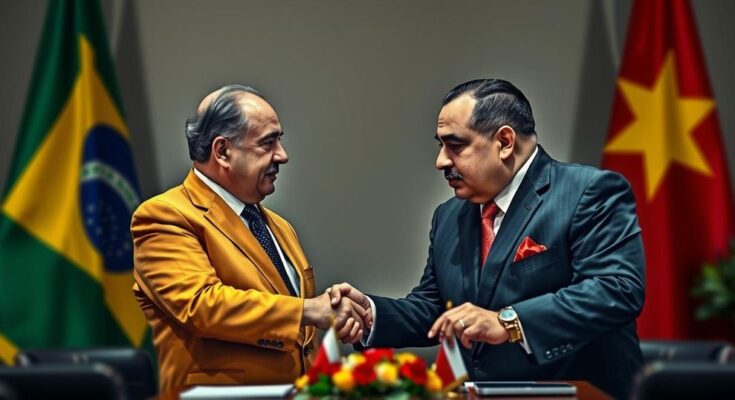President Xi Jinping’s visit to Brazil seeks to strengthen bilateral ties with President Lula, particularly amid global uncertainties surrounding U.S. policy changes under Trump. The two nations aim to enhance trade relations and reposition themselves as leaders in the Global South, with China looking to support Brazil’s value-added exports while navigating the geopolitical context of recent international conflicts.
President Xi Jinping of China is scheduled to visit Brazil on Wednesday, following a successful engagement at the G20 and APEC summits. During his meeting with Brazilian President Luiz Inacio Lula da Silva, Xi aims to further develop bilateral relations between China and Brazil, particularly amidst the uncertainties surrounding potential policy changes under a renewed Trump administration. With Trump poised to adopt a more confrontational stance toward China, both nations are keen to bolster their strategic cooperation and leadership within the Global South. The partnership between China and Brazil has been significant, marked by a trade volume of over $160 billion in the previous year, with China being Brazil’s largest trading partner. Xi emphasized the need to synergize development strategies and address common international issues during his discussions with Lula. Meanwhile, Brazil is eager to enhance exports of value-added goods, moving beyond its traditional reliance on primary commodities such as soybeans. Lula has undertaken a delicate balancing act in foreign relations, reinforcing ties with both China and the United States. His administration’s recent engagement with China, including Vice President Geraldo Alckmin’s visit to Beijing, indicates Brazil’s interest in joining the Belt and Road Initiative. This initiative is seen as a crucial component of Xi’s broader strategy to expand China’s influence across global markets. The geopolitical context of these discussions is also influenced by the ongoing conflicts in Ukraine and the Middle East, and Brazil’s continued position against sanctioning Russia as a BRICS member. The meeting between Xi and Lula commemorates 50 years of diplomatic relations, with analysts suggesting that Lula will seek adjustments in their economic ties to better benefit Brazilian enterprises. In light of a potentially less prominent U.S. role in Latin America due to emerging policies under Trump, this meeting carries significant implications for the future economic landscape of the region.
The meeting between Presidents Xi Jinping and Luiz Inacio Lula da Silva occurs against a backdrop of shifting geopolitical landscapes and trade relations. As key players in the Global South, both nations are striving to enhance their positions amid rising global tensions and economic uncertainties attributed to policies under U.S. leadership. Xi’s visit underscores the importance of strengthening Brazil-China relations, particularly as they mark 50 years of diplomatic ties. The evolving dynamics also highlight the contrasting approaches to international relations, particularly concerning interactions with Russia and the implications of U.S. policies under President Trump, who has signaled a tougher stance towards China. In addition, the economic context is critical, with significant trade exchanges falling between agricultural commodities and manufactured goods. The mutual interest in expanding these commercial avenues establishes a foundation for deeper collaboration. Furthermore, Brazil’s interest in joining the Belt and Road Initiative represents a strategic maneuver to integrate more fully within China’s broader economic framework, thereby enhancing its international standing while also navigating its relationships with Western powers.
In conclusion, the upcoming meeting between Presidents Xi and Lula represents a pivotal moment for both nations as they navigate complex geopolitical and economic landscapes. The focus on enhancing bilateral ties aims to address trade imbalances and strengthen partnerships as both countries aspire to assert their roles as leaders in the Global South. As global uncertainties persist, particularly in light of changing U.S. strategies, Brazil and China are poised to reinforce their collaboration to foster growth and stability in their respective economies while enhancing mutual benefits.
Original Source: www.voanews.com




